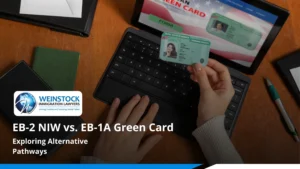Guide to Higher Education as an Undocumented Student
It can be tough to narrow down higher education options after graduation for most students. There are state and private college options, trade schools, and community colleges to choose from, and each option offers a different price point, a different trajectory, and a different path. These choices become even more difficult when there are other hurdles to clear, like the ones that undocumented immigrant students face while trying to navigate the higher education landscape in the U.S.
The National Immigration Law Center legally defines undocumented individuals as foreign nationals who entered the U.S. without proper documentation or with false documentation. It also includes those who came to the U.S. legally but then remained despite expired visas. Of the estimated 10.5 million to 12 million undocumented immigrants who were living in the United States in 2020, about 2% — or about 454,000 students — were undocumented immigrants enrolled in higher education.
These students, often referred to as DACA recipients or DREAMers, are typically brought to America by their parents at young ages, and the majority of these students identify as Americans, having grown up among their peers in public schools in the U.S. But while most undocumented students typically view themselves as Americans, the reality is that they do not share the same rights and privileges as their American peers. Federal funding for college is tough, if not impossible, to obtain, and there are other education-related hurdles, too.
That said, the benefits of encouraging undocumented students to attend college are easy to see — and include things like more well-rounded communities filled with educated professionals and boosts to the economy via tuition checks and taxes. The goal of this guide is to help support undocumented students reach their educational goals, obtain a degree, and secure a job after graduation. While it’s not a replacement for legal advice, this guide offers invaluable resources and tips from the experts who have gone through the process and can offer more insight into navigating the higher education landscape as an undocumented student.
The Application Process
The college application process is intimidating for the everyday student. It can be even more challenging for undocumented students, who must also contend with their own set of unique challenges when applying to college.
Difficulties
There are many unique challenges undocumented students face when enrolling in college. For starters, many undocumented students will also be first-generation college students.
Take, for example, the enrollment breakdown at the University of California. At UC, about 41% of the enrolled student population is comprised of first-generation students. Being a first-generation student can make the application process a lot harder because many immigrant parents aren’t bilingual and cannot help with confusing paperwork. Even if their parents are bilingual, they are likely still unfamiliar with the enrollment process — which can add to the stress and challenges associated with the admissions process.
It is something that Oscar Gonzalez has seen time and again as the Assistant Director of Admissions and Interim Director of Accessibility Resources at Minnesota State University, Mankato.
“Distance or separation from family members can make it harder to submit transcripts, ACT scores, and other documents without a parent or guardian’s direct support,” Gonzalez said. “Undocumented students may need support finding other institutional funding. Not providing documentation could hurt a student’s chances for admission or lead to unawarded student financial assistance.”
If you’re facing similar challenges, your guidance counselors at your high school or college’s admissions department can help you navigate the application process. It may also help to know that most schools will have an application process that requires the following documents and paperwork for admission:
Typical Documents for College Admissions
- Online or paper application
- Personal statement or letter of intent
- High school transcripts
- Student personal essay
- Letters of recommendation
- Test scores
- Any associated application fees
Of these requirements, there are two areas where most undocumented students typically stumble on their applications. These include:
- Country of citizenship: Some applications may provide an option for “no selection.” If this option does not exist, in many cases, you can simply leave the question blank and move onto the next question.
- Social security number: Undocumented students do not have social security numbers (SSNs), so you may also be able to skip this question.
That said, some schools will require proof or evidence of how long you have been in the U.S., but the exact requirements will vary by school. You can inquire about these types of requirements with the admissions office at the colleges you’re applying to. This will give you an idea of what, if anything, you will need to provide in addition to your general application.
Rights
As an undocumented student, you have challenges ahead of you — but you also have rights when it comes to higher education.
According to 1975’s Plyler v. Doe, undocumented students have the right to attend U.S. colleges and universities, and under this ruling, there is no federal requirement for proof of citizenship for college admission.
That said, some states will place certain restrictions on higher education enrollment or tuition for undocumented students. Be sure to study your state’s laws so you are aware of the possible limitations on your enrollment or funding options.
The 1974 Family Educational Rights and Privacy (FERPA) Act affords extra protections to undocumented immigrants as well. This act made it illegal for schools to inquire about or publicly disclose any information regarding a person’s immigration status. You must give express permission before a school can disclose your personal information to outside groups. It also provides parents and caregivers with rights to access information surrounding their children’s education — and the schools educating them.
Navigating Citizenship
You may also have a path to citizenship as an undocumented student, provided you fit within certain parameters of the acts that allow for you to apply.
There are two main programs that provide support to undocumented individuals: the DREAM Act and DACA.
The DREAM Act
You have likely heard of DREAMers or may have been called one yourself. The popular colloquialism is another way of referring to the DREAM Act, which protects the children of undocumented immigrants.
Although Congress has yet to pass a final version of the bill, this act can provide a path to legal citizenship through the use of two critical programs: Temporary Protected Status (TPS) and Deferred Enforced Departure (DED).
The DREAM Act is critical to undocumented people for several reasons:
- It establishes permanent legal residency status for those who qualify.
- It provides past, current, and future undocumented students who qualify with the opportunity to graduate high school.
- It provides high school and GED graduates who qualify with U.S. citizenship through college, work, or military service.
The process is meant to guide children of undocumented immigrants through conditional permanent residence (CPR) — and then legal permanent residence (LPR) status. After a five-year LPR period, the process allows for naturalization.
As of June 2021, two new versions of the DREAM Act were sitting before Congress for passage: the Dream Act of 2021 (S. 264), and a renewed edit of the Dream Act that is a part of the more comprehensive Dream and Promise Act of 2021 (H.R. 6).
Eligibility Requirements of the Proposed 2021 DREAM Act
| DREAM ACT OF 2021 (S. 264) | DREAM AND PROMISE ACT OF 2021 (H.R. 6) | |
|---|---|---|
| Age of arrival (years) | 17 or younger | 18 or younger |
| Continuous physical presence since | Four years prior to bill enactment date | January 1, 2021 |
| Conditional Permanent Residence (CPR) period | 8 years | 10 years |
| Disqualifying criminal behavior | Aggravated felony Moral turpitude offenses Drug-related offenses Offense with any maximum penalty of 1-year imprisonment Three or more offenses resulting in 1-year imprisonment or more | Any felony offense Moral turpitude offenses Drug-related offenses Three or more misdemeanors Domestic violence |
| Exceptions | Offenses related to lack of immigration status | Offenses related to lack of immigration status Minor traffic offenses Some marijuana-related offenses Nonviolent civil disobedience Certain offenses involving victims of domestic violence Threats to public safety Gang participation within the last five years |
Deferred Action for Childhood Arrivals Program (DACA)
In total, estimates note that there are nearly 1.5 million children and young adults who are eligible for DACA status. In total, that comprises about 13% of all undocumented people in the U.S.
The Deferred Action for Childhood Arrivals (DACA) is a policy initiative that was established in 2001 and reinforced by the Obama administration in 2012. This policy allows for a two-year deferred action for the children of undocumented people, meaning that while you do not have legal status, you will not be deported during the two-year protections, either. During this period, you are able to work and go to school, but privileges could be revoked should you break the law.
The 2021 DACA requirements are effective as of December 7, 2020 and are based upon the pre-September, 5, 2017 terms of the DACA policy. DACA is available to those who meet specific eligibility requirements.
DACA Eligibility Requirements
| Applicant requirements | Students currently enrolled in school, High school and GED graduates Honorably discharged veterans of the U.S. Coast Guard or Armed Forces |
| Age requirements | Under the age of 31, as of June 15, 2021 Came to the U.S. before the age of 16 |
| Residency requirements | Continuous residence since June 15, 2007 Physical U.S. presence on June 15, 2012 No legal immigration status on or before June 15, 2012 Expiration of lawful immigration or parole status on or before June 12, 2012 |
| Criminal requirements | No felony convictions No significant misdemeanor charge Two or fewer other misdemeanors Not deemed a national security or public safety threat |
Applications are being accepted by U.S. Citizenship and Immigration Services (USCIS) for first-time deferred action requests and for DACA renewal requests. USCIS is also accepting applications for advance parole documents and extensions for single-year DACA deferred action grants and DACA employment authorization.
Funding Your Education
Federal law places severe restrictions on the type of funding undocumented students can receive for higher education. Without the Social Security number necessary, students cannot file the Free Application for Federal Student Aid (FAFSA®) application to receive federal assistance with their college tuition. Without the ability to file the FAFSA, students are also essentially barred from receiving other types of federally-funded financial aid, like loans, grants, and work-study funds.
Because of these restrictions, one of the best ways for undocumented students to fund their higher education is through scholarships. Scholarship programs for undocumented students include:
For 50 years, MALDEF has been supporting the Latino community through paid scholarships and resources for students of all ages, with a special Law School Scholarship Program for law students.
Designed specifically for DREAMERS, TheDream.US offers two scholarship programs: the National Scholarship and the Opportunity Scholarship. These scholarships are geared toward those who came to the U.S. before November 1, 2015.
The Golden Door Scholars scholarship program has 20 different partner schools that it works with. Thus far, the program has produced about 112 graduates and counting, with 354 current scholars in total. Scholarships are available for high school seniors, recent high school graduates, and current college undergraduates.
While IMMIGRANTS RISING is not accepting scholarships for 2021, it has compiled several comprehensive resources for students, including lists for 2021 undergraduate scholarships, graduate scholarships, undergraduate fellowships, and graduate fellowships.
Advice from an Expert
Rachel Coleman is an independent education consultant (IEC) at CollegeEssayEditor.com and an active member of the Higher Education Consultants Association (HECA). She has worked for over six years in the college admissions counseling field and shares with us her experience.
“Undocumented students face innumerably more challenges and stresses than U.S. citizens when navigating the college application process, and later, the job market,” Coleman said.
“Depending on the state, qualifying for in-state tuition is an immediate barrier,” she said. “Most states do not consider undocumented students eligible for in-state tuition or local grants, so they are treated as ‘international’ students in the process.”
This can mean having to pay top dollar for their education, according to Coleman.
“My advice to undocumented students would be to establish residency in a state where their education could be subsidized by the state government,” Coleman said. “This could be in the form of a ‘gap year’ or a year working in that state. [It’s] far better to wait a year and qualify for in-state tuition than take out student loans for 100K.”
It worked for Jessica Robinson, an educator at The Speaking Polymath.
“The DACA Act helped me with my education,” Robinson said. “I lived in California, and with DACA protection, I was able to receive in-state tuition. This helped me a lot financially.”
If you are interested in attending a college, Gonzalez, who works for Minnesota State University, Mankato, recommends that you visit the campus directly to submit your application.
“Meet with an admissions officer to get all your admission questions answered,” he said. “Connect with Diversity & Inclusion resources on the campus you are considering to learn more about opportunities available for students.”
After graduation when it comes to finding a job, Coleman suggests networking within your industry.
“It’s always best to speak with someone who is an expert in the field and can help students make the most strategic [or] smart choices for themselves,” she said.
Elizabeth Ricci, who serves as the liaison for the Florida DMV, notes the importance of applying for DACA quickly — and in the near future.
“Apply for DACA now!” she said. “USCIS is an incredibly bureaucratic, inefficient agency. Their wait times are unreasonable, and their service is horrible. Customers find themselves being asked for duplicate information, waiting months or years, and having USCIS misplace their documents and evidence.”
Ricci also noted that there could be potential hurdles you’ll face even after DACA status is obtained.
“Anti-immigrant states like Florida, Georgia and Alabama put up hurdles for DACA holders and other immigrants to encourage them to leave the country,” Ricci said. “Request a travel document for an educational, employment or humanitarian reason. The travel document does not require an emergency. If the DACA holder leaves the US and reenters legally on the travel document, they have a lawful entry, and immigration opportunities are wide open.”
Additional Support for Undocumented Students
Whether you need help with applying for acceptance or tuition, there are countless programs across the United States that can help you with your educational journey. Some may even help you find a job after you graduate. The organizations you may want to look into include:
Educational resources
- 10,000 Degrees: This resource offers financial support, advising, mentoring, and planning resources for college students.
- Golden Door Scholars: This group offers tuition support for DACA recipients, learners with temporary protected status, and other eligible undocumented immigrants pursuing undergraduate degrees.
- Immigrants Rising: This group connects educators, educational professionals, and students with scholarship opportunities, legal support, and educational workshops for undocumented students or workers in the United States.
- My Undocumented Life: This resource is dedicated to the experience of being an undocumented student, with plenty of resources, support, and even scholarships to help.
- Office for Civil Rights: This group provides guidance and advocacy for students dealing with exclusion or discrimination from an educational institution.
- Paul and Daisy Soros Fellowships for New Americans: This group awards up to $90,000 to 30 qualifying applicants.
- Student Privacy Policy Office: This group handles student privacy in compliance with the Federal Educational Rights and Privacy Act and the Protection of Pupil Rights Amendment.
- United We Dream: This is the nation’s largest community run by immigrant youth.
Post-graduation employment
Many schools offer their own resources for upcoming or recent graduates who are looking for work. These organizations include:
- American Council on Education: This council advocates for graduates, especially of STEM courses, to stay within the U.S. after college.
- The DREAMer Jobs Facebook Group is an online networking group designed to employ undocumented graduates.
- Immigrant Rising and the University of California teamed up to offer this Income Generation Options for Undocumented Students Toolkit.
- The University of Pennsylvania and the University of California provide a list of DACA-friendly employers.
- The National Immigration Law Center provides legal assistance to immigrants with low income with additional comprehensive information on DACA and workplace rights.
Conclusion
Applying for college as an undocumented student can be lonely and stressful, but there is plenty of support available to help you. Plus, research can go a long way when it comes to applying to universities and paying your tuition, so be sure to do your due diligence regarding eligibility requirements and resources.
And, despite what challenges may come, Coleman encourages you to stay positive.
“My main advice for undocumented students is that there is hope!” she said. “Now, more than ever before, there are resources, scholarships, and educators who care deeply about education equity and access and are just waiting to help students navigate this complex process. Yes, the path may be complicated, but it’s not impossible.”
This article was submitted by: Rachel Stanton, Communications Coordinator. BestValueSchools
Related Posts

Exploring Alternative Pathways: EB-2 NIW vs. EB-1A Green Card
Summary Two of the most sought-after green card options for highly qualified professionals are: EB-2 National Interest Waiver (NIW) EB-1A Extraordinary Ability visa Both allow

TN Visa for Remote or Hybrid Work: Navigating USMCA Rules
Summary If you’re a Canadian or Mexican entrepreneur living in the U.S. or planning to launch a business here, you may be wondering: Can I

Impact of USCIS Policy Updates on EB-2 NIW Petitions: What You Need to Know
Summary The EB-2 National Interest Waiver (NIW) offers a pathway to U.S. permanent residency without employer sponsorship, ideal for professionals and skilled workers. Recent USCIS
